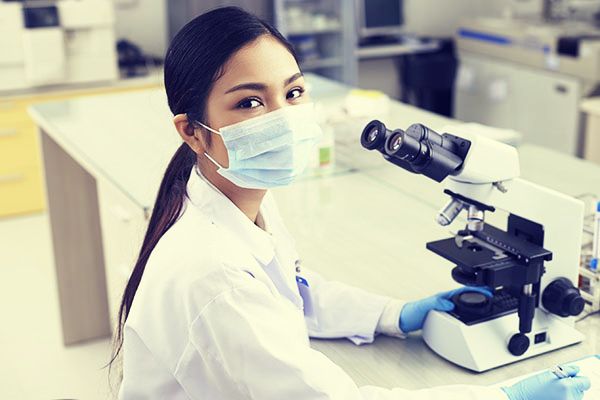 BS in Medical Technology in the Philippines BS in Medical Technology (BSMT), also known as as Bachelor of Science in Medical Laboratory Science, is a four year degree program that equips students with knowledge and skills in laboratory tests used in the detection, diagnosis, prevention, and treatment of diseases. The program consists of general education subjects (such as English and Filipino) and professional subjects (such as Clinical Chemistry and Blood Banking). You will be taught on how to collect, preserve and analyze specimens such as blood, urine, cells and tissues as well as the preparation of reagents (compounds or substances added to a specimen in order to create a chemical reaction) and stains (a discoloration made by a foreign matter) . The program will also train you on how to use modern equipments, instruments and scientific methods to provide accurate laboratory results. Ladderized Curriculum Being a ladderized course, students who successfully complete a specific year level and pass the TESDA Competency Assessment are issued the National Certificate (NC) on that particular level. For the BSMedtech program, certifications are only given starting the second year. The following are the certifications given upon a student’s successful completion of the second year.
Subjects and Curriculum The subjects in the BS MedTech curriculum are divided into four main categories:
Students of the BS MedTech program spend most of their time in the classroom listening to lectures and inside the laboratory doing practicum exercises. They are able to learn the different clinical laboratory tests through return demonstrations. Clinical Instructors will perform the procedure first, afterwards, students will have the chance to do the procedures themselves and will be graded based on a performance rating scale. In the fourth year of the program, students need to complete a research paper. Once finished, they will defend their work in front of a panel and will be graded on a certain criteria. The second semester of the fourth year level is the internship program in an accredited training laboratory with rotational duties in the different sections such as Clinical Chemistry, Hematology, Microbiology, Immunohematology, Immunology and Serology, Urinalysis and Body Fluids, Parasitology and Histopathology. Is Medical Technology a profession? Medical Technology is a profession. A graduate of BS in Medical Technology who passed the board examination is called a Registered Medical Technologist (RMT). Medical technologists analyze samples of body fluids and cells. They study the specimens for bacteria and parasites and identify chemicals contained in them. They perform blood matching for patients who require transfusions and analyze drug levels in a patient's blood to determine his reaction to treatment. They also study test results and communicate the findings to doctors. They can specialize in a variety of areas, such as microbiology, Immunohematology, immunology or molecular biology. What are the admission requirements for BSMT? Requirements at each school may differ, but these are the common requirements:
What skills are required to succeed in this course? The following are the most important skills that you have to possess or develop:
How difficult is this course? BSMT is a moderately difficult course. Although the program contains a lot of Science and Medical subjects, they require you to use basic level of thinking and a few complex thinking skills. Concepts in Medical Technology only need recall/memory, analysis and synthesis. In addition, laboratory procedures during clinical internships are routinely done thus providing you with the chance to master every laboratory tests. How long does it take to complete the Medical Technology program in the Philippines? The BSMT program takes 4 years to complete. Some schools who follow a trimesteral curriculum complete the course in less than 4 years. Depending on the school, clinical internships during the fourth year may last 3 to 7 months. Review for the board examination takes an additional 6 months to a year, depending on whether you pass your first try. Medical Technology Internship Training Program This is an intensive practical and theoretical training that usually takes place during the fourth year. Medical Technology students are assigned to clinical/hospital laboratories where they perform lab tests and other diagnostic examinations. They may be allowed to perform tests in Hematology (Complete Blood Count, Platelet Count) , Immunohematology (Blood Banking), Urinalysis and many more. According to CHED (official governing body of higher education institutions), the total number of exposure/contact hours in the laboratory is 1,786 hours. Specializations
The Board ExamA graduate of BS in Medical Technology needs to take the Medical Technology Board Examination before he/she can practice the profession. The Board of Medical Technology facilitates the exam under the supervision of the Professional Regulations Commission (PRC). It is scheduled twice a year in the months of September and March. Examination questions come from six major subjects with their corresponding relative weight. Clinical Chemistry, Microbiology and Parasitology, Hematology, Blood Banking and Serology each have 20% while Clinical Microscopy (Urinalysis and other body fluids) and Histopathologic Technique each have 10%. To pass the examination you should obtain a general weighted average of 75% with no rating below 60% in all the subjects. Career Opportunities for BSMT graduates
Apply Now. |
AuthorArchives
December 2017
Categories
All
|
 RSS Feed
RSS Feed
